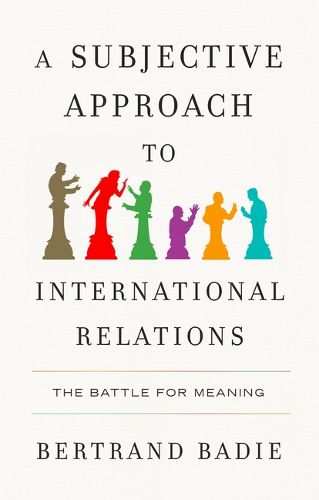Readings Newsletter
Become a Readings Member to make your shopping experience even easier.
Sign in or sign up for free!
You’re not far away from qualifying for FREE standard shipping within Australia
You’ve qualified for FREE standard shipping within Australia
The cart is loading…






China's growing power and Russia's invasion of Ukraine have thrust geopolitics back to the centre of the global stage, but the old frameworks of international relations, with their positivist methods and their emphasis on structural determinants, will not enable us to understand the increasingly dangerous world in which we are living today.
Bertrand Badie argues that states and the many other actors now operating in the international arena are products of their cultural contexts and political traditions. Their perspectives and motivations are profoundly subjective in character and are shaped by the narratives, memories and emotions that constitute people's everyday realities. In Badie's view, international disputes in the twenty-first century are best understood through the concept of the 'battle for meaning', confrontations between different modes of understanding the world. His judgement is that peace and stability depend on greater sensitivity to the worldviews of other actors in the international arena. A willingness to try to see the world from the perspective of one's friends, rivals and even one's enemies is vital.
This timely and engaging book by one of the world's leading scholars of international relations will be of great interest to students and scholars in politics and IR and to anyone concerned about the growing tensions in the world today.
$9.00 standard shipping within Australia
FREE standard shipping within Australia for orders over $100.00
Express & International shipping calculated at checkout
China's growing power and Russia's invasion of Ukraine have thrust geopolitics back to the centre of the global stage, but the old frameworks of international relations, with their positivist methods and their emphasis on structural determinants, will not enable us to understand the increasingly dangerous world in which we are living today.
Bertrand Badie argues that states and the many other actors now operating in the international arena are products of their cultural contexts and political traditions. Their perspectives and motivations are profoundly subjective in character and are shaped by the narratives, memories and emotions that constitute people's everyday realities. In Badie's view, international disputes in the twenty-first century are best understood through the concept of the 'battle for meaning', confrontations between different modes of understanding the world. His judgement is that peace and stability depend on greater sensitivity to the worldviews of other actors in the international arena. A willingness to try to see the world from the perspective of one's friends, rivals and even one's enemies is vital.
This timely and engaging book by one of the world's leading scholars of international relations will be of great interest to students and scholars in politics and IR and to anyone concerned about the growing tensions in the world today.